 This screen indicates that this individual’s driver’s license is not valid. (TSA photo)
This screen indicates that this individual’s driver’s license is not valid. (TSA photo)
LINTHICUM, Md. — New technology that confirms the validity of a traveler’s identification (ID) and confirms their flight information in near real time is now in use at all of the Transportation Security Administration (TSA) security checkpoints at Baltimore-Washington International/Thurgood Marshall Airport.
TSA has 36 credential authentication technology (CAT) units in use at the airport that are equipped with cameras and are used to match the individual’s face with the face that appears on the traveler’s ID such as the person’s license or passport. The technology enhances detection capabilities for identifying fraudulent documents at the security checkpoint. The photos are not saved and are only used to match the person standing at the travel document checking podium with the photo on the ID that is being presented. 
“This technology is valuable because it enhances detection capabilities for identifying fraudulent IDs such as driver’s licenses and passports at a checkpoint and it increases efficiency by automatically verifying a passenger’s identification,” said Christopher Murgia, TSA’s Federal Security Director for Maryland. “This helps ensure that we know who is boarding flights. The system also confirms the passenger’s flight status by verifying that the individual is ticketed to fly out of that airport on that day.”
As an additional feature, the unit is “self-service,” meaning that the passengers insert their ID and do not have to hand it to a TSA officer. Thus the units reduce touchpoints and speed the process. Travelers insert their ID, look at the camera and if the ID is validated, the traveler then proceeds into the checkpoint. Even with TSA’s use of these units, travelers still need to check-in with their airline in advance and bring their boarding pass to their gate to show the airline representative before boarding their flight.
CAT units have what we call a “library” of IDs programed into it that allow the unit to authenticate more than 2,500 different types of IDs including passports, military common access cards, retired military ID cards, Department of Homeland Security Trusted Traveler ID cards, uniformed services ID cards, permanent resident cards, U.S. visas and driver’s licenses and photo IDs issued by state motor vehicle departments.
